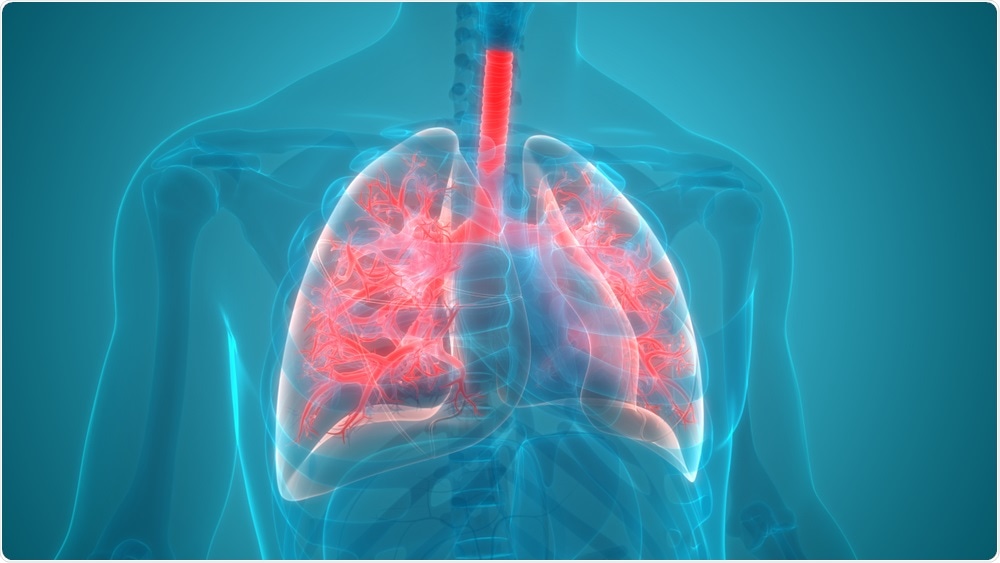Dr. Park and I have been conducting studies on cadmium toxicity for many years and knew that it is damaging to the lungs through a mechanism that may involve compromising the lung’s immune system.
The research we undertook was therefore designed to use the data available from a very large general population study, the U.S. National Health and Nutrition Examination Survey (NHANES), to see whether cadmium exposure increases the risk of death from viral infections and pneumonia.

Pneumonia. Image Credit: Magic mine/Shutterstock.com
What is cadmium and where is this chemical commonly found?
Cadmium is a toxic metal pollutant that people have been exposed to due to its dispersion into air, soil, water, and sewage from mining, smelting, and the manufacturing (and associated emissions) of nickel-cadmium batteries, pigments, plastics, and other products.
Such dispersion has led to the uptake of cadmium in many plant species that humans consume (as well as tobacco, a major source of cadmium exposure), as well as in animal meats, particularly organs such as the liver and kidneys.
Can you describe how you carried out your research into cadmium and its effect on viral infections?
We used data from the NHANES study’s adult participants on cadmium levels in urine, which signify accumulated body burdens of cadmium, and examined their relationship to each participant’s subsequent risk of dying from influenza virus or pneumonia.
What did you discover?
We found that in comparison to participants whose cadmium levels were low (in the lowest 20%), participants whose cadmium levels were high (in the top 20%) had a 15% higher risk of dying from influenza or pneumonia.
The risk was even higher among never-smokers (27%).

Cadmium Test. Image Credit: bangoland/Shutterstock.com
Why is it difficult for the human body to excrete cadmium compared to other toxic metals?
Unlike the main route of excretion for most other toxic metals, cadmium is not effectively excreted by the kidneys.
Do you believe that cadmium could be responsible for the severity of COVID-19 infections in some individuals?
That is a suspicion that is raised by our study.
As more data is now available on COVID-19, do you plan on further assessing the link between cadmium and COVID-19 severity?
Yes, we aim to directly study the potential role of cadmium burdens in worsening COVID-19 severity in terms of severe lung disease and death.
How can people reduce their exposure to cadmium?
Smokers should stop smoking since cigarettes are a major source of cadmium. Meat eaters should consider avoiding organ meats, particularly the liver and kidneys. Unfortunately, other sources of dietary cadmium include foods that are consumed by many as part of a balanced, nutritious diet, such as rice, cereal grains, potatoes, and leafy vegetables.
Regarding vegetables, a dietary strategy could be shifting to vegetables like cabbage and broccoli, which do not concentrate cadmium. Most of all, policy changes are needed to reduce the sources of pollution that contribute to cadmium in our food supply.

Smoking. Image Credit: Nopphon_1987/Shutterstock.com
How can your research help to raise awareness of reducing cadmium exposure? What can policymakers do to help spread awareness?
Since it may be difficult for people to avoid cadmium exposure given its presence in many common foods, it is imperative to continue policy efforts that reduce and eliminate the discharge of cadmium pollution into the environment; and to continue the monitoring of cadmium in foods and in samples of the general population (such as NHANES, which continues to collect data on a general population sample of Americans throughout the United States).
What are the next steps in your research?
We aim to leverage the archived urine samples and data of patients hospitalized with COVID-19 to directly test the hypothesis that cadmium burdens may worsen pulmonary and mortality outcomes from COVID-19.
Where can readers find more information?
The full scientific paper can be found at https://ehp.niehs.nih.gov/doi/10.1289/EHP7598
About Dr. Howard Hu
Dr. Hu, a physician-scientist-epidemiologist, has been a tenured Professor, Director, Department Chair, and Dean in positions at Harvard (1990-2006), the University of Michigan (2006-2012), and the University of Toronto (2012-2018). He is currently Professor and the Flora L. Thornton Chair of the Department of Preventive Medicine in the Keck School of Medicine of the University of Southern California.
Dr. Hu has led international teams investigating the environmental, nutritional, social, and epi/genetic determinants of chronic disease and impaired child development in population-based studies based in the U.S., Mexico, India, China, and elsewhere around the world. His team’s work has been continuously funded by the U.S. National Institutes of Health, generated over 300 publications, and won many awards.
Dr. Hu has served on the Board of Population and Public Health Practice of the Institute of Medicine/National Academy of Sciences; the Board of Environmental Studies and Toxicology of the National Research Council; and on the External Advisory Council of the U.S. National Institute for Environmental Health Sciences. He has also been a Senior Fulbright Scholar (in India, 1999-2000), a member of the Board of Directors and investigator on four fact-finding missions for Physicians for Human Rights; and the Chair of the Research Commission for the International Physicians for the Prevention of Nuclear War.
Dr. Hu received an M.D. from the Albert Einstein College of Medicine; an M.P.H. and Sc.D. (epidemiology) from the Harvard School of Public Health, and is board-certified in Internal Medicine and Preventive (Occupational) Medicine.